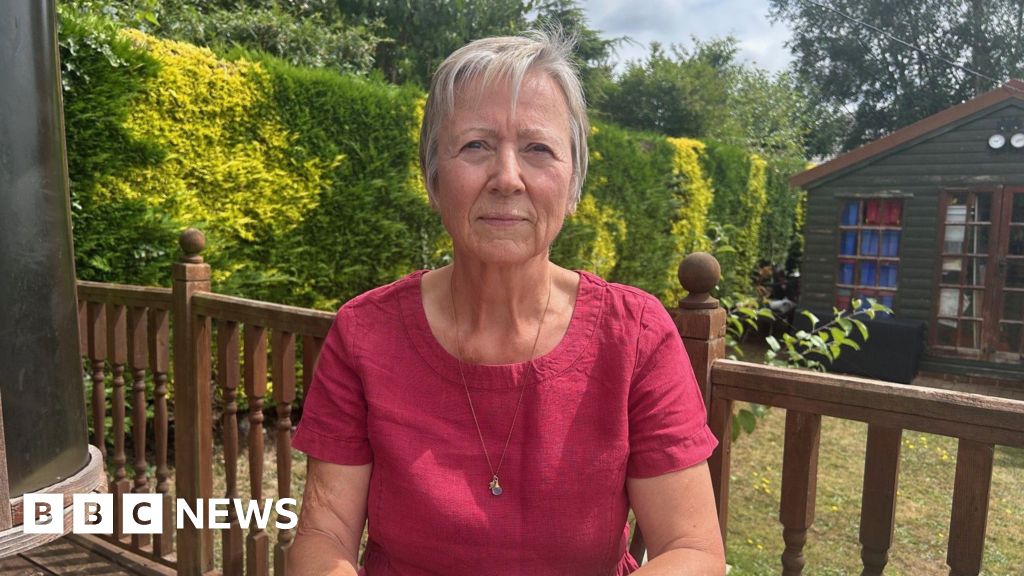BBC South West health correspondent
Some patients in Devon have said they are spending hundreds of pounds a year on thyroid drugs which are not routinely prescribed on the NHS.
While liothyronine (T3) can be prescribed by NHS specialists, the standard treatment from other NHS doctors in Devon is levothyroxine – known as T4.
The British Thyroid Foundation said that, despite efforts to work with NHS England to clarify guidance, patients in some parts of the country struggled to get T3 prescriptions.
NHS Devon said its advice for prescribing T3 was out for “specialist review”. The National Institute for Health and Care Excellence (NICE) said there was “currently not enough evidence T3 was safer or more effective long-term than T4”.
The thyroid is a gland in the neck which makes hormones to help control energy levels and growth.
An underactive thyroid can make people feel tired, experience weight gain, low mood and low libido.
Vivienne Wells, 68, from Exeter, was diagnosed with an underactive thyroid 18 years ago. She said the hormone replacement T4 worked for 10 years but she then felt like she had “fallen off a cliff”.
“My dose was constantly raised and raised but I felt consistently worse,” she said.
“I couldn’t work. My brain wouldn’t work. I couldn’t think.”
She was referred to an endocrinologist – a hormone specialist – who prescribed a low dose of T3.
Currently only endocrinologists can prescribe the hormone long-term.
Going private
Ms Wells said her brain function improved within two days of taking T3.
She said she wanted a larger dose prescribed long-term, but it was not available on the NHS.
She said she now spent hundreds a year buying T3 and another drug, naturally desiccated thyroid (DCT), from a private UK pharmacist.
“Without these drugs, I wouldn’t function,” she said.
“I wouldn’t be able to get up in the morning and decide what I want to do and achieve it.”
Ms Wells added: “You get more successful treatment in some areas of the country, but a lot of people have to pay privately and a great number of people who need to be treated privately, can’t afford it.”
Jane Chapple, 70, from Exeter, was diagnosed with an underactive thyroid in 2004.
She sources T3 from overseas and in 2020 set up a Devon and south-west England thyroid support group which has more than 500 members.
“I think everybody who needs that drug should have access to it. It shouldn’t be a postcode lottery,” she said.
“It would save the NHS a lot of money if people were treated properly with the drug that suits them best.”
Simon Waters, 56, from Woodbury Salterton, was diagnosed with an overactive thyroid in 1991 and had the last remaining part of his thyroid removed in 2020.
He was prescribed T4 but suffered chronic diarrhoea and tiredness.
He said he was given T3 by a friend and, within hours, his symptoms had stopped.
He now buys T3 from an online pharmacy overseas.
“The big symptom which cleared up almost immediately was diarrhoea. It cleared up within hours of taking the drug.”
NHS Devon said current advice was T3 should only be given by an NHS consultant endocrinologist when being prescribed for hypothyroidism.
The British Thyroid Foundation said this reflected a regional variance in prescribing T3.
It said NHS guidance was unclear and left scope for local prescribing bodies to “de-prescribe, limit prescriptions or not initiate new patients on this treatment”.
The charity said scientific evidence to support the benefits of T3 was unclear so not all endocrinologists were willing to prescribe it. But the charity supported calls for more research.
Julia Priestley, from the charity, said: “We think patients who have been shown to have a clinical need for T3 should be able to access it on the NHS, wherever they live.
“We work with other UK charities to help patients who may benefit from T3 to obtain it fairly, consistently and based on clinical need.
“We also support research to answer unsolved questions about T3’s effectiveness and long-term safety.”
The charity warned that self-sourcing the drug without appropriate medical supervision could be dangerous.
A spokesperson for NHS Devon said it currently had local guidance on the prescribing of liothyronine.
“Updated guidance, which adopts the advice published by NHS England is currently out for specialist review, with a view to be published in the autumn,” it added.
A spokesman said the price of T3 was “significantly higher” than T4.
“Since 2017, the price of T3 has fallen but it is still significantly higher than the price of levothyroxine tablets.”
NHS Devon added some exceptions had been made for a cohort of patients who were found to require T3 following a clinical working group.
Source link
